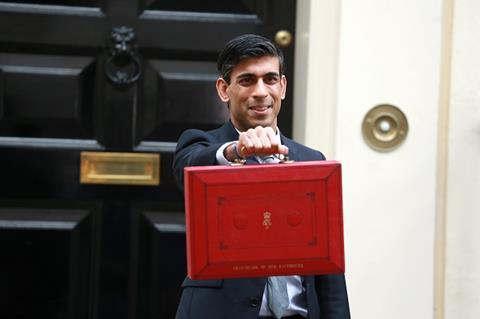‘Exit charge’ for housing associations if they are deemed to be making a profit-making in the ‘wider sense’
Larger housebuilders will be required to pay 4% in tax annually on trading profits above £25m, Rishi Sunak has announced.
Sunak announced more detail about the residential property developer tax, which will raise £2bn for building safety remediation works over 10 years, in his budget speech today.

The tax will apply to trading profits on residential property development activity, which will be defined in the Finance Bill, which is currently going through parliament. It will also apply to businesses who have an interest in the land “that forms part of their trading stock”.
The tax level was announced by Sunak as part of a package of housing measures which he termed a “multi-year housing settlement totalling nearly £24bn” (see box).
At-a-glance: housing measures in the Autumn Budget
- Re-confirmation of the £11.5bn Affordable Homes Programme to build 180,000 homes
- £1.8bn brownfield housing fund to bring 1,500 hectares into use
- £5bn to remove unsafe cladding, supported by £2bn from the residential property developer tax
- £640m to tackle rough sleeping and homelessness
- £950 million for the Home Upgrade Grant
- £800 million for the Social Housing Decarbonisation Fund.
As previously reported, build to rent activity will be exempt from the tax, while most housing associations, as non-profit organisations, will also be exempt. This is because it “is possible for taxable trading profits to arise within a group that is not profit-seeking in the wider sense”, a government response to a consultation published alongside the budget said.
However, the government said that an “exit charge” would be applied if an affordable housing body “benefitting from the exemption ceases to qualify for it”.
It said: “The government recognises that some would have preferred a broader approach which would exempt all registered providers of affordable housing.
“However, it believes that such an exemption is not justified on the grounds that the development of affordable housing with a view to making a profit from that activity, is clearly the development of residential property.”
The tax will raise £200m in 2022/23, £215m in 2023/24, £225m in 2024/25, £235m in 2025/26 and £250m in 2026/27, budget documents said.











No comments yet